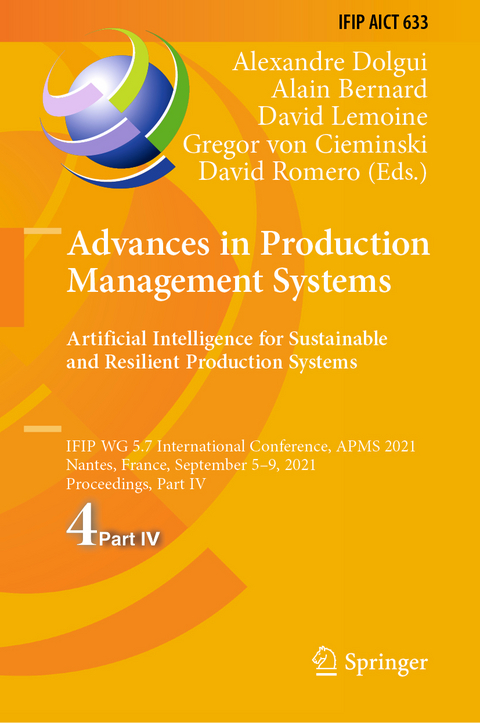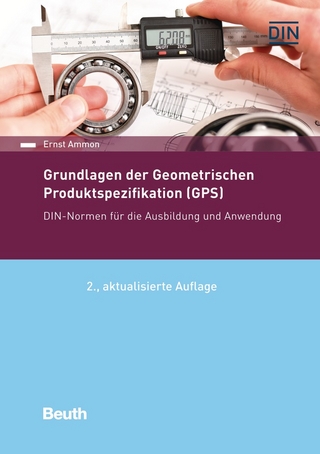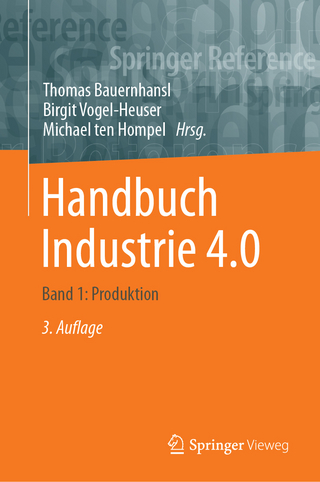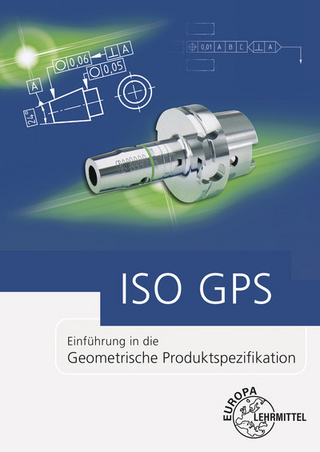
Advances in Production Management Systems. Artificial Intelligence for Sustainable and Resilient Production Systems
Springer International Publishing (Verlag)
978-3-030-85909-1 (ISBN)
The 378 papers presented were carefully reviewed and selected from 529 submissions. They discuss artificial intelligence techniques, decision aid and new and renewed paradigms for sustainable and resilient production systems at four-wall factory and value chain levels. The papers are organized in the following topical sections:
Part I: artificial intelligence based optimization techniques for demand-driven manufacturing; hybrid approaches for production planning and scheduling; intelligent systems for manufacturing planning and control in the industry 4.0; learning and robust decision support systems for agile manufacturing environments; low-code and model-driven engineering for production system; meta-heuristics and optimization techniquesfor energy-oriented manufacturing systems; metaheuristics for production systems; modern analytics and new AI-based smart techniques for replenishment and production planning under uncertainty; system identification for manufacturing control applications; and the future of lean thinking and practice
Part II: digital transformation of SME manufacturers: the crucial role of standard; digital transformations towards supply chain resiliency; engineering of smart-product-service-systems of the future; lean and Six Sigma in services healthcare; new trends and challenges in reconfigurable, flexible or agile production system; production management in food supply chains; and sustainability in production planning and lot-sizing
Part III: autonomous robots in delivery logistics; digital transformation approaches in production management; finance-driven supply chain; gastronomic service system design; modern scheduling and applications in industry 4.0; recent advances in sustainable manufacturing; regular session: green production and circularity concepts; regular session: improvement models and methods for green and innovative systems; regular session: supply chain and routing management; regular session: robotics and human aspects; regular session: classification and data management methods; smart supply chain and production in society 5.0 era; and supply chain risk management under coronavirus
Part IV: AI for resilience in global supply chain networks in the context of pandemic disruptions; blockchain in the operations and supply chain management; data-based services as key enablers for smart products, manufacturing and assembly; data-driven methods for supply chain optimization; digital twins based on systems engineering and semantic modeling; digital twins in companies first developments and future challenges; human-centered artificial intelligence in smart manufacturing for the operator 4.0; operations management in engineer-to-order manufacturing; product and asset life cycle management for smart and sustainable manufacturing systems; robotics technologies for control, smart manufacturing and logistics; serious games analytics: improving games and learning support; smart and sustainable production and supply chains; smart methods and techniques for sustainable supply chain management; the new digital lean manufacturing paradigm; and the role of emerging technologies in disaster relief operations: lessons from COVID-19
Part V: data-driven platforms and applications in production and logistics: digital twins and AI for sustainability; regular session: new approaches for routing problem solving; regular session: improvement of design and operation of manufacturing systems; regular session: crossdock and transportation issues; regular session: maintenance improvement and lifecycle management; regular session: additive manufacturing and mass customization; regular session: frameworks and conceptual modelling for systems and
AI for Resilience in Global Supply Chain Networks in the Context of Pandemic Disruptions.- Covid-19 Ripple Effect and global supply chain productivity impacts through pandemic propagation modelling.- A vector logistic dynamical approach to epidemic evolution on interacting social-contact and production-capacity graphs, and its proxy economic cost assessment.- Stochastic Logistic Shocks on Supply Chain Networks.- Towards explainable artificial intelligence (XAI) in supply chain management: a typology and research agenda.- Distribution of Vaccines During a Pandemic (Covid-19).- Blockchain in the Operations and Supply Chain Management.- Blockchain-based master data management in supply chains: a design science study.- Blockchain for Product Authenticity in the Cannabis Supply Chain.- A Blockchain-based Manufacturing Service Composition Architecture for Trust Issues.- An Approach for Creating a Blockchain Platform for Smart Labeling and Tracing Wines and Spirits.- Blockchaindesign for digital supply chain integration.- Data-Based Services as Key Enablers for Smart Products, Manufacturing and Assembly.- Customer Order Scheduling in an Additive Manufacturing Environment.- A Conceptual Reference Model for Smart Factory Production Data.- Generating Synthetic Training Data for Assembly Processes.- Data Acquisition for Energy Efficient Manufacturing: A Systematic Literature Review.- Review of Factors influencing Product-Service System Requirements along the Life Cycle.- Data-Driven Methods For Supply Chain Optimization.- Data-Driven Solutions for the Newsvendor Problem: A Systematic Literature Review.- An Information Sharing Framework for Supply Chain Networks: What, When, and How to Share.- A robust data driven approach to supply planning.- Responsible Manufacturing with Information Disclosure under Regulatory Inspections.- Understanding supply chain visibility through experts' perspective: A Delphi based approach.- Digital Twins Based on Systems Engineering and Semantic Modeling.- STARdom: an architecture for trusted and secure human-centered manufacturing systems.- .Semantic Modeling Supports the Integration of Concept-Decision-Knowledge.- Model-based Systems Engineering Supporting Integrated Modeling and Optimization of Radar Cabin Layout.- Supporting Digital Twin Integration Using Semantic Modeling and High-Level Architecture.- Digital Twin-driven Approach for Smart City Logistics: The Case of Freight Parking Management.- Digital Twins in Companies First Developments and Future Challenges.- The Advent of the Digital Twin: A Prospective in Healthcare in the Next Decade.- Reviewing the application of data driven digital twins in manufacturing systems: a business and management perspective.- Improving a manufacturing process using recursive artificial intelligence.- Digital Twin in the agri-food supply chain: a literature review.- A Digital Twin implementation for manufacturing based on open-source software andstandard control systems.- Human-Centered Artificial Intelligence in Smart Manufacturing for the Operator 4.0.- Towards Active Learning Based Smart Assistant for Manufacturing.- Human-AI Collaboration in Quality Control with Augmented Manufacturing Analytics.- Digital Platform and Operator 4.0 Services for Manufacturing Repurposing during COVID19.- Anatomy of a digital assistant.- Human in the AI Loop in Production Environments.- Operations Management in Engineer-To-Order Manufacturing.- Value Stream Mapping for knowledge work: a study from project-based engineering-to-order organization.- Servitization in Engineer to Order Companies: a Systematic Literature Review.- The unexpected consequences of the Covid 19 on managing ETO projects.- Requirements for Sales and Operations Planning in an Engineer-to-Order Manufacturing Environment.- A systematic approach to implementing multi-sourcing strategy in engineer-to-order production.- Product and Asset Life Cycle Management for Smart and Sustainable Manufacturing Systems.- A holistic approach to PLI in Smart Maintenance towards sustainable Manufacturing.- Sustainable maintenance performances and EN 15341:2019: an integration proposal.- System-level Overall Equipment Effectiveness for improving Asset Management performance: a case study application.- Semantic Interoperability and Sustainability an Industry 4.0 Product Life Cycle issue.- The Concept of Sustainable Maintenance Criteria Assessment.- Cost Projections for the Product Life Cycle at the Early Stages of Product Development.- Robotics Technologies for Control, Smart Manufacturing and Logistics.- Redundancy Resolution in Kinematic Control of Serial Manipulators in Multi-Obstacle Environment.- Automatic Drones for Factory Inspection: The Role of Virtual Simulation.- Geometric error modeling and sensitivity analysis of a laser pipe-cutting system based on Lie group and Sobol method.- Tensegrity Morphing: Machine Learning-based Tensegrity Deformation Predictor for Traversing Cluttered Environments.- Seed-and-Prune Approach for Rapid Discovery of Tensegrity-like Structures of the Desired Shape.- Serious Games Analytics: Improving Games and Learning Support.- Experiencing the Role of Cooperation and Competition in Operations and Supply Chain Management with a Multiplayer Serious Game.- Towards a serious game on data sharing in business ecosystems.- Accessibility Considerations in the Design of Serious Games for Production and Logistics.- Smart and Sustainable Production and Supply Chains.- Achieving Circular and Efficient Production Systems: Emerging Challenges from Industrial Cases.- Value stream mapping (VSM) to evaluate and visualize interrelated process-chains regarding Circular Economy.- Research on a preannounced pricing policy in a two-period dual-channel supply chain.- Sustainable and Resilience improvement through the Design for Circular Digital Supply Chain.- A literature review on smart technologiesand logistics.- A robust optimization model for a 2-service community healthcare service network problem.- A Review of Explainable Artificial Intelligence in Production.- The Impact of the Number of Regulated Suppliers in Sustainable Supply Chains on Corporate Financial Performance.- Digitalization for resilience and sustainability during the Covid-19 pandemic: an explorative event study.- Smart Methods and Techniques for Sustainable Supply Chain Management.- Minimising total costs of a Two-Echelon Multi-Depot Capacitated Vehicle Routing Problem (2E-MD-CVRP) that describes the utilisation of the Amsterdam city canal network for last mile parcel delivery.- Evaluating the deployment of collaborative logistics models for local delivery services.- Suppliers selection ontology for viable digital supply chain performance.- Green supply chain management: a meta-analysis of recent reviews.- Development of an Eco-efficiency distribution Model: A Case Study of a Danish Wholesaler.- TheNew Digital Lean Manufacturing Paradigm.- The automation of lean practices: digitalized or digitally wasted?.- Study of the Predictive Mechanism with Big Data-Driven Lean Manufacturing and Six Sigma Methodology.- Industry 4.0: expectations, impediments and facilitators.- Digital Tools for lean manufacturing: the need for proper implementation.- Reflections from a hybrid approach used to develop a specification of a shopfloor platform for Smart Manufacturing in an engineered-to-order SME.- The Role of Emerging Technologies in Disaster Relief Operations: Lessons from COVID-19.- Shelter location-allocation problem with vulnerabilities of network and disruption of shelter during response phase of disaster.- Technologies helping Smart Cities to build Resilience: focus on COVID-19.- Key success factors for supply chain sustainability in COVID-19 pandemic: an ISM approach.
| Erscheinungsdatum | 04.09.2021 |
|---|---|
| Reihe/Serie | IFIP Advances in Information and Communication Technology |
| Zusatzinfo | XXVI, 737 p. 218 illus., 173 illus. in color. |
| Verlagsort | Cham |
| Sprache | englisch |
| Maße | 155 x 235 mm |
| Gewicht | 1304 g |
| Themenwelt | Informatik ► Weitere Themen ► CAD-Programme |
| Schlagworte | Applications • Artificial Intelligence • Computer Networks • Computer Science • conference proceedings • Correlation Analysis • Databases • Data communication systems • HCI • Human-Computer interaction • Industrial Engineering • Industry 4.0 • Informatics • Information Technology • Internet • Manufacturing Engineering • Network Protocols • Research • sensors • Signal Processing • software architecture • Software Design • Software engineering • Telecommunication networks • User Interfaces |
| ISBN-10 | 3-030-85909-6 / 3030859096 |
| ISBN-13 | 978-3-030-85909-1 / 9783030859091 |
| Zustand | Neuware |
| Haben Sie eine Frage zum Produkt? |
aus dem Bereich


